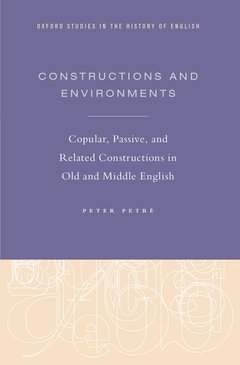Description
Constructions and Environments
Copular, Passive, and Related Constructions in Old and Middle English
Oxford Studies in the History of English Series
Author: Petré Peter
Language: English
Subject for Constructions and Environments:
Publication date: 08-2014
320 p. · 23.6x16.3 cm · Hardback
320 p. · 23.6x16.3 cm · Hardback
Description
/li>Biography
/li>
This monograph presents the first comprehensive diachronic account of copular and passive verb constructions in Old and Middle English. The mysterious loss of the high-frequency verb weorthan 'become' is explained as a casualty of changing word order in narrative during Middle English. The merger of is 'is' and bith 'shall be, is generally' into a single suppletive verb is related to the development of a general analytic future shall be. The co-occurrence of multiple changes led to become and wax crossing a threshold of similarity with existing copulas, from which they analogically adopted full productivity in one fell swoop. In explaining each of these changes, the book goes beyond the level of the verb and its complements, drawing attention to analogical networks and the importance of a verb's embeddedness in clausal and textual environments. Using a radically usage-based approach, treating syntax as emerging from (changing) frequencies, Peter Petré draws attention to general principles of constructional change, including but not limited to grammaticalization and lexicalization. He proposes novel parallelisms between linguistic and ecological evolution. Going beyond the view of language change as propagating only in social interaction, Petré explains how each individual's mental grammar can be seen as a dynamic ecosystem with hierarchical environments (clausal niches, textual habitats). In this view, the interconnectedness of seemingly unrelated changes, itself resulting from cognitive economy principles, is arguably more decisive in lexical change than is functional competition.
Peter Petré holds a PhD in linguistics from the KU Leuven (University of Leuven). His research aims at keeping a wide view, combining insights and research methods from linguistics, history, philosophy, and research on evolutionary systems.
© 2024 LAVOISIER S.A.S.
These books may interest you

Reduced Constructions in Spanish 160.25 €

Reduced Constructions in Spanish 53.83 €


